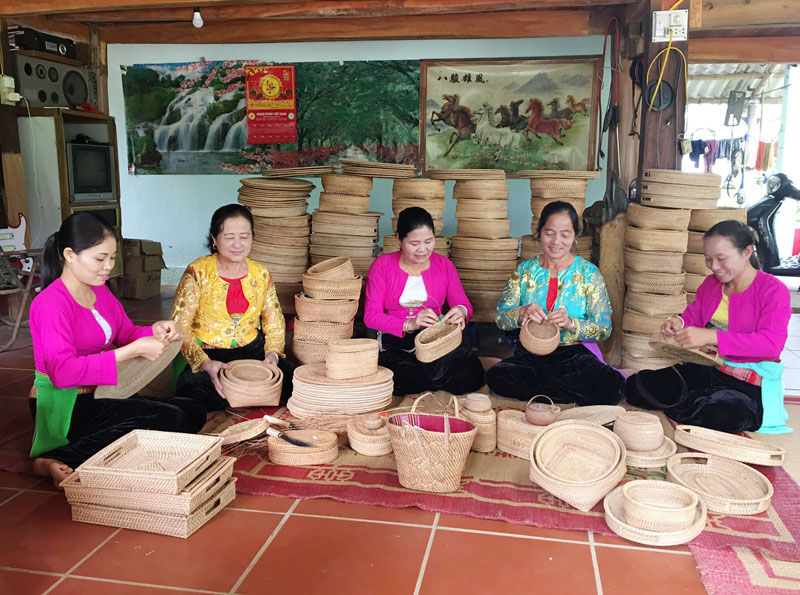
(HBO) – In an effort to improve the efficienucy of patriotic emulation movements, Lac Son district in Hoa Binh province has stepped up the building, dplication and honouring of role models.
 The rattan
and bamboo cooperative in Bui hamlet, Nhan Nghia commune, Lac Son district, is
an outstanding model in developing traditional crafts, and creating jobs and
increasing income of its members and women.
The rattan
and bamboo cooperative in Bui hamlet, Nhan Nghia commune, Lac Son district, is
an outstanding model in developing traditional crafts, and creating jobs and
increasing income of its members and women.
Role
models are sought in different sectors and from all social strata, especially
labourers and units that have overcome difficulties to move ahead.
One
of the role models is Bui Van Chun’s family in Doi hamlet, Van Nghia commune,
with a farm of bitter melon, pumpkin and cucumber in combination with pig
breeding. His family earns 100-110 million VND per year from the farm.
Another
is the family of Quach Phien from Chieng hamlet, Phuc Tuy commune (now Quyet
Thang commune) that has successfully developed a household economy model. From
growing 1.2ha of ‘doi’ trees for seeds, his family pockets over 600 million VND
each year and creates stable jobs for four local labourers.
In
implementing Plan No. 181 dated November 11, 2019 on duplicating role models in
Hoa Binh province, Lac Son district has selected the rattan and bamboo cooperative
run by Bui Thi Sanh in Bui hamlet, Nhan Nghia commune, and the "joining hands
for the community” model launched by the district police for the programme.
The
programme has helped to promote emulation movements across spheres in the locality.
The local Party Committee, authorities, armed forces, businesses and people are
joining hands in an emulation movement in 2020./.
The Standing Board of the Hoa Binh provincial Party Committee has agreed in principle on a proposal by the Standing Board of the Party Committee of Hoa Binh city to gather feedback on the city’s 1:2000 zoning plan, which forms part of its broader urban development strategy.
Hoa Binh province has made notable progress in public administration reform and digital government development, with the satisfaction index among citizens and businesses reaching over 84%, according to recent government evaluations.
Thanks to great efforts by local authorities in recent times, the governance and public administration performance of Mai Chau district has been significantly improved.
In the afternoon of June 6, the Party Committee, the People's Council, the People's Committee and the Fatherland Front of Lac Son district solemnly held a meeting to celebrate the 139th anniversary of the district's founding (1886–2025) and the 79th anniversary of the establishment of the district's Party Committee (1946–2025). There was the attendance of Mr. Bui Van Thang, the Vice Chairman of the Provincial People's Council; Mr. Quach Tat Liem, the Vice Chairman of the Provincial People's Committee; Ms. Dang Bich Ngoc, the Deputy Head of the National Assembly Delegation of the province; as well as the former leaders of the province and district through various periods, who are the natives of the district.
Implementing the Politburo’s Resolution No. 57-NQ/TW on breakthroughs in science – technology, innovation, and digital transformation is a golden opportunity for the northern mountainous province of Hoa Binh to renew growth model, improve competitive edge and shorten digital gap.
Resolution 57-NQ/TW, issued by the Politburo on December 22, 2024, identifies sci-tech, innovation, and digital transformation as strategic breakthroughs to build a developed and prosperous nation. In Hoa Binh province, this spirit is not just a slogan, it’s being put into action through concrete initiatives that form a "new development triangle”: digital citizenship, digital economy, and digital administration.



 The rattan
and bamboo cooperative in Bui hamlet, Nhan Nghia commune, Lac Son district, is
an outstanding model in developing traditional crafts, and creating jobs and
increasing income of its members and women.
The rattan
and bamboo cooperative in Bui hamlet, Nhan Nghia commune, Lac Son district, is
an outstanding model in developing traditional crafts, and creating jobs and
increasing income of its members and women.